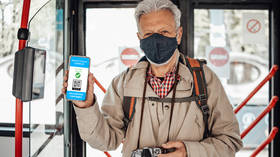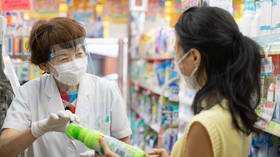What’s behind the worrying trend of people deliberately infecting themselves with Covid-19?

If you are, like me, vaccinated against Covid-19 and do not want to catch this nasty virus, you may find it counterintuitive that some people are deliberately infecting themselves with it. But that is what is happening, especially in places with strict rules placing limits on what unvaccinated people can do. Where I live in Italy, there is increasing evidence of Covid self-infection as limitations on unvaccinated people are strengthening.
I first noticed news of Corona ‘parties’ for people to get infected last November in northern Italy.Sky reported these parties were attracting a lot of attention in Telegram groups in the Bolzano area and that these had spread from Austria and Germany, where the report claimed the superspreading shindigs were born. Indeed, the report noted the tragic death of a 55-year-old man in Austria after he was infected at a Corona party. At the time, I thought self-infection involved very few people and mostly hard core ‘anti-vax’ activists in places like Bolzano, which has had a reputation for low Covid-19 vaccination rates for a long time.
Yet self-infection with Covid-19 has become more widespread in Italy, as laws restricting participation in work, education, and social life for unvaccinated people are implemented. Since last summer, to work in healthcare in Italy, it has been necessary to possess a green pass, which indicates being vaccinated against Covid-19 or recently having recovered from the virus. “We have received various notifications of dinners with positive people organized by unvaccinated nurses,” stated Samanta Grossi, the president of the Professional Nurses association in my nearby city of Treviso. Unvaccinated nurses and other healthcare employees who test positive for Covid-19 avoid suspension from work and pay.
Similarly, employees in education in Italy have been required to demonstrate they are vaccinated or have recently recovered from Covid-19 since last September. An unvaccinated preschool teacher who has been suspended from work recently decided to infect herself with the virus. Police and school headteachers have reported that teachers have been able to get infected and continue teaching in schools by attending dinners with people who are positive with Covid-19. In some instances, they were told some teachers were prepared to pay 200 to 300 euros to do so.
Following a government decree passed in January, from February 1, 2022 every Italian aged fifty or over who cannot prove vaccination or recent Covid-19 infection faces a fine of €100. This decree includes unemployed people. My wife has a friend in her early fifties who is unvaccinated and is currently unemployed, as she works in tourism during the summer months. This friend has refused to get vaccinated, as she believes the government is using the green pass to track and control people. She recently deliberately self-infected with Covid-19.
From February 15, all Italian employees over fifty years old will require a ‘super’ green pass or risk being suspended from work without pay and fined between €600 and €1500. Since last September, employees could also get the previous green pass by producing a negative test for Covid-19 every two to three days and continue working. But negative tests will no longer be valid to obtain a super green pass. I know an unvaccinated supermarket manager in his mid-fifties who is worried about the safety of Covid-19 vaccines and has been taking frequent tests to work. He recently decided to self-infect with the virus so he can keep on working.
Some 7.4 million Italians and 1.89 million over fifty years old remain unvaccinated.
Last week, a ‘No Vax’ mother living near Venice invited 20 people to her house to get infected with Covid-19 after her children caught the virus. “Come to my house, my children have contracted coronavirus. In this way, you can also get infected, receive the super green pass, without being subjected to vaccination,” was reported to be her invitation. “The episode of the mother and of the party for children is despicable,” remarked Silvia Susanna, a local mayor, and president of the Conference of Mayors for Health, who warned of the risks of having the virus for people of all ages. Likewise, in the USA, where there has been a tradition of chickenpox parties to purposely infect kids, doctors have warned against deliberate infection against Omicron variants.
The risks of self-infecting with Covid-19 are greater for people over fifty than children, as demonstrated by the death of the unvaccinated Czech singer Hana Horka. She died last month aged 57 after deciding to get purposely infected by staying with her infected and vaccinated husband and son. After getting infected, she wrote on social media, “Now there will be theater, sauna, a concert,” before she sadly died. In the Czech Republic, proof of vaccination or recent recovery from the virus is needed to enter many social venues.
Social restrictions on unvaccinated people put them under considerable pressure. In Italy, not having a super green pass means adults cannot go into bars, restaurants, cafes, hotels, gyms, cinemas, theaters, museums, concerts, schools, universities, sports venues, and ski lifts, and they cannot take domestic flights, trains, metros, ferries, or buses.
Such punitive rules against unvaccinated people should be canceled, although requiring healthcare and care home employees to vaccinate is legitimate protection. While many governments are removing regulations restricting unvaccinated people, this needs to be accelerated. We should encourage people to get vaccinated, but not by making unvaccinated people second class citizens.
The statements, views and opinions expressed in this column are solely those of the author and do not necessarily represent those of RT.














